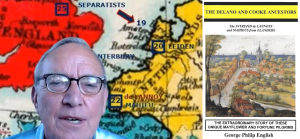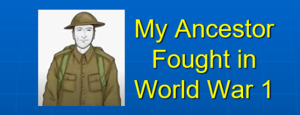In Part 1, discover how various types of surnames became established in England, Scotland, Wales, Ireland and other countries. Learn how the origins of a surname can help to prove and disprove descent, and in the telling of your family story. In Part 2, we present a genuine case where we used the origins of a surname to solve a claim of descent that had been made more than 100 years before.
What we’re going to look at this time is that very fascinating question, where does my surname come from? And particularly, how does that help in finding your ancestors?
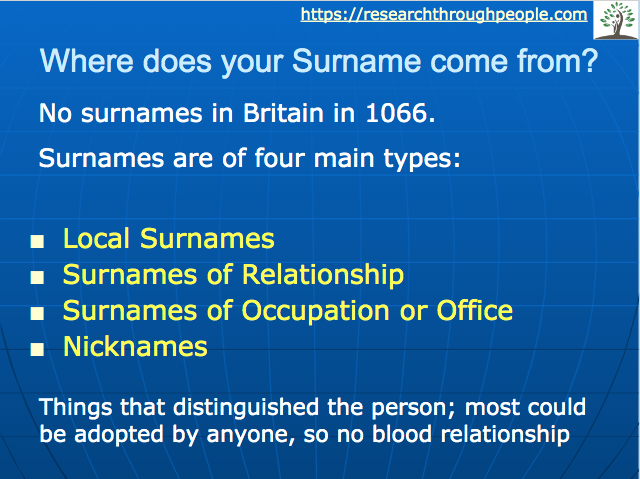
So, let’s have a look at where your surname might have come from. If you go back in time, most Britons know that William the Conqueror came over in 1066. There were no surnames then. They’ve all developed since and they fall into one of four main types.
Local Surnames
The Official name is Toponymic, place name. But they may be to do with all sorts of places or features. And you see common names here, Hill or Wood, London, Glasgow, places like that. The towns and villages and so forth. And nationality, English and Scott. And basically the surname was something that evolved that distinguished that person from other people. They live near the hill or wood, they were from London and so forth.
Surnames of Relationship
Obviously if someone was the son of someone, and usually it varies slightly. In England, they tend to add ‘son’ on, as in Johnson. In Scotland, ‘mac’ means son, so that goes at the beginning of McDonald. And in Wales, what they tend to do is just make a plural name, Jones, Williams, and so forth. And in Ireland, O’Brien is frequently used.
Surnames of occupation or office
Then there are occupations. What distinguished the person was they were a smith, a tailor, a baker, a slater, and so forth. An obvious distinguishing feature.
Nicknames
And lastly, nicknames. All sorts of types and things. Brown, they had a dark complexion. Short, strong, etc. Campbell means twisted mouth. So, there are all sorts of ways, and you look at these names, look at them. Virtually none of these could not be adopted by a lot of people who were not related. Do not assume because your surname is the same as someone else that you must be related. So no blood relationship just because the name is the same. But of course, there may be.
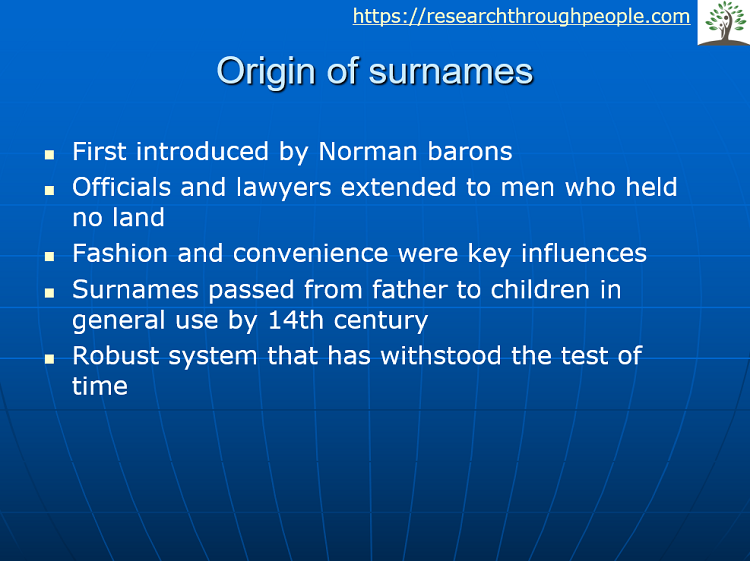
Where do Surnames come from? As I said, when William the Conqueror came over there were no surnames. Gradually they were introduced by the Norman barons, particularly when they were given land in England and they tended to choose their name after the land they had. Or possibly from where they came from back in France or wherever. And so, in other words, the nobles first got names, and then officials and lawyers found it useful because they could identify the person very clearly and then they gradually extended it to people who had no land.
Now, sometimes a surname was obvious but it was a system that evolved. There was no official guidance on what you should do. Like so many things, fashion played a part. Convenience. And gradually the surnames extended and extended and that system of the father’s surname passing down to the children was in general use by the 1300’s. So, something like 600, 700 years ago, most of our surnames were being used. And what’s amazing really, you think about it, what a fantastic robust system that has stood the test of time. We are able to very clearly identify people from way back or from now because of the systems of names.

So, let’s look in a bit more detail at types of surnames. I mentioned local surnames to do with a place or feature:
- Feature – things like hill, wood, moor. You can imagine the person lived on the outskirts of the village by the hill. As simple as that it might be, and they became known by that name.
- Locality and place – many, many examples of this. London, Glasgow. You could go through the map, almost, and just pick out names that are surnames. If you’re in America, some of your most famous presidents, George Washington, Abraham Lincoln, were named after places in England. Sometimes an estate. People who lived near an estate, just like a town of village, took that name.
- Nationality – and then in a similar vein, nationality. And you didn’t get called Scott or English in Scotland or England. You got called it because you were living elsewhere and that distinguished you. I’ve had a lot of look at the Flemish people who came over to Scotland and England, and by and large, if you’re called Fleming you came over without a surname and then you were given that surname when you were living over here.
So, second type is relationship.
- Patronymic – these are things obviously that are to do with the patron of the surname. And so let’s look at this. I mentioned earlier that typically with the relationship, the son of John, the son of Donald, the son of Brian, in different countries. Very common type of surname.
- Fealtic – is interesting because of course in Scotland, in particular, and in Ireland, there’s the clan system. Whereby there’s the clan, say the MacDonald clan. There are the blood descendants of the actual MacDonald clan hierarchy. But there’s a lot of people who were, in a sense, adopted or adopted the clan. They were not blood relations but they were protected by the clan and they gave their services to the clan and that happened a lot with servants as well. Servants of nobility very often took the name. The key thing, not a blood relationship. So don’t assume that.
Nicknames. There’s just a whole raft of examples of this.
- Physical or moral – characteristics that distinguished the person. They were brown, dark complexion, short, strong. I mentioned Campbell earlier, Crooked mouth. Cruickshank, Twisted leg in Scotland.
- Animals and birds – you think about, do you know someone called Bull or Lamb or Finch? Then there’s all sorts of other things.
- Seasons of the year, summer, festivals, oaths, and even obscenities. So fascinating. But again, very few surnames which someone could not adopt without being related to that person.

And what we do in our reports, we try and have a look at the surnames and see if we can give you a bit of help on that. So that’s a couple of recent examples I picked out.
- Here is someone called Dick. Just as simple as that, a shortened version of Richard and one of relationship clearly.
- Woodburn. In Scotland, the burn is the stream. So the person lived by the wood burn. And then we look at, where is it most common? You can tell very often from the past whether it evolved. So I found quite a lot in the Northwest of England, particularly in Ayrshire on the West side of Scotland.
- Scott, an obvious name means a native of Scotland. And most common on the Scottish English border. And you can imagine Scottish people going and living in the North of England being called Scott, and then maybe over time moving back to Scotland and so forth. And it’s the 10th most common surname in Scotland. Very important thing. If a surname is very common, the odds of you being related are much less than if it’s a very rare one. And I picked out one which is quite a rare name.
Shirt. And we wouldn’t immediately know that that’s a place in the parish of Stockport in Cheshire. But that case is interesting, because that’s a really rare name. Much more likely if someone was called Shirt that there might be a relationship, but we need to know a lot more before we can make that conclusion.
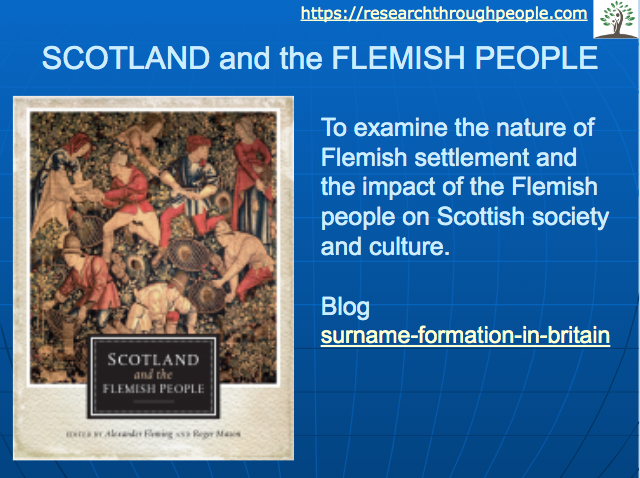
I mentioned the Flemish thing. I’ve recently been involved for a few years in a project about Scotland and the Flemish People. The book has come out this year. It was there to examine the interaction between Flanders and Scotland over the years, and they ran a blog for a whole lot of times. So, if you’d like to know more about surnames, I produced another blog on ‘Surname Formation in Britain’ as part of the ‘Scotland and the Flemish People’ Project. If you read this particular topic, that will give you a lot more information.

So what’s crucial. You come to us and say, what are the chances of success? Of course, what often happens, there is a family belief that “we are descended from someone”, et cetera. So, if the relationship is in the last couple of hundred years from 1800, the chances of finding out whether that’s true or not are good, because the records are good. The registration of births, marriages, and deaths and so on.
Many of these family lore things go back a lot further in time before 1800, and the key problem there is that there are far fewer records. We talk about primary records that were recorded at the time. The baptism of someone or the birth. And secondary things that are recorded later, say like a census would record someone’s age, but that’s a few years after, et cetera. And far fewer records in general.
- In terms of status, the typical status that might be recorded was nobility. people owning land. But a lot of the things that we get these days just would not be recorded.
- The sort of records, the main source of birth, marriages, and deaths, or baptisms, marriages, or banns, burials, is the parish register. But sometimes we’re looking at deeds. What sort of documents were there? Legal deeds, fiscal deeds, and so forth that may play a part.
- Crucial in terms of whether there’s some success here, the actual name. Was it common or was it unusual? I can tell you if your surname is Smith, it’s very unlikely you’re related. Whereas if you’ve got a very unusual surname, there’s a much better chance.
- Continuity And one of the good things in the past, people tended to stay in the same place. So we do occasionally come across situations where there’s a name, a number of people over a number of generations with the same unusual name. We may not actually be able to prove, find the evidence of that connection, but it’s a reasonable assumption that it is likely. And that’s one of the key things. Let’s form a balanced view based on the facts, on the evidence. Not pluck something out of the air.
So, I mentioned this, we quite often get people to come along and say, “We’re descended from royalty.” And there can be sincere claims there. There are some that were deliberately made up.
Quite interesting, I was talking to the head of the ScotlandsPeople Centre recently and he was saying that quite often people come from overseas, and a lot of them claim that they were descended from Robert the Bruce in the 1300’s. Or the poet Robbie Burns. He said he even had someone who claimed they were descended from Greyfriars Bobby. Now, Greyfriars Bobby was a faithful dog of an owner. When the owner died, Greyfriars Bobby was in Edinburgh and went along every day to the grave of his master. So unlikely there’s a relationship there! We’ve had someone who actually claimed they were descended from a queen who had no children and could not bear children. Anyway, that’s joking. What we try and do, is, if someone comes along with a “We believe, we think, we may…” We have a serious look at it.
In Part 2, take a look at an example where we used the origins of surnames to solve a 100 year old claim of descent.
So, delighted if you want to get in touch, but please feel free to do so. Here are our contact details, the website. We have three packages, Gold, Silver, and Bronze. You can send us an email, info@researchthroughpeople.com. We look forward to hearing from you.


